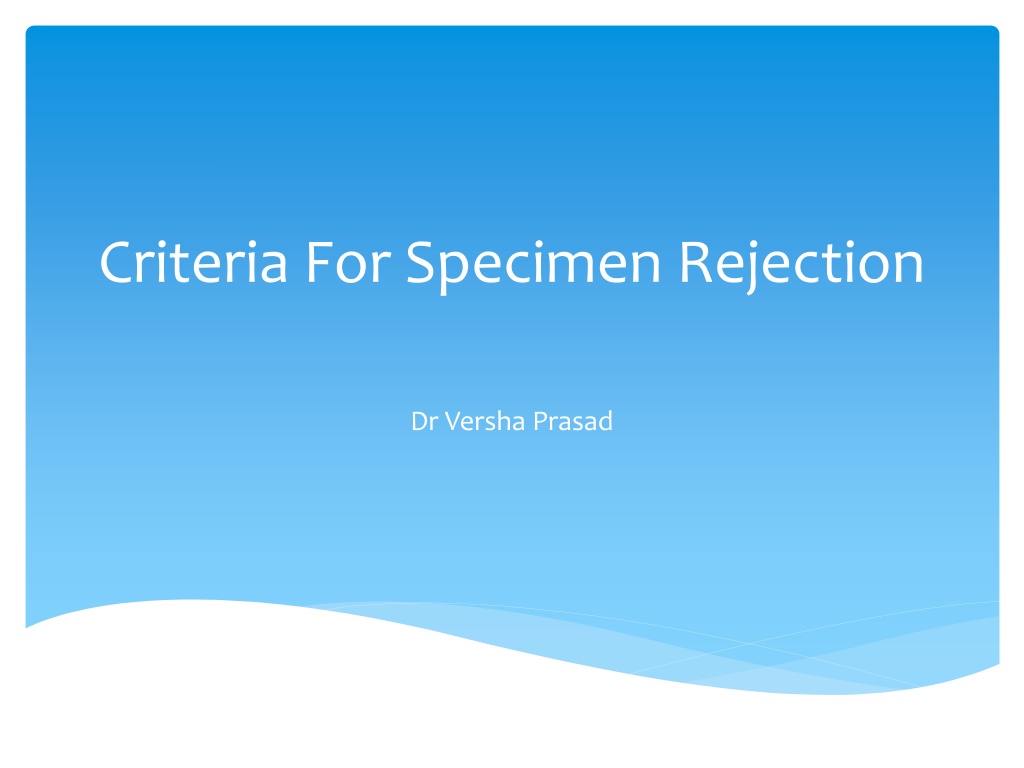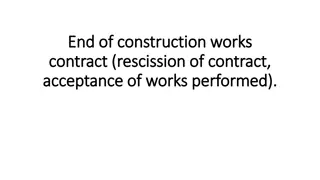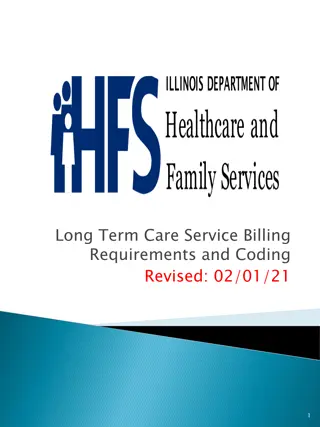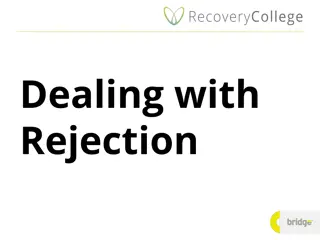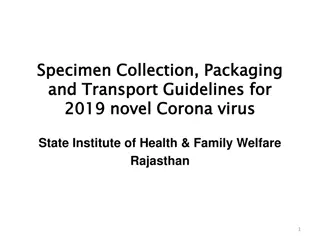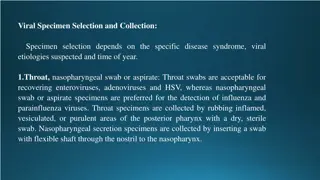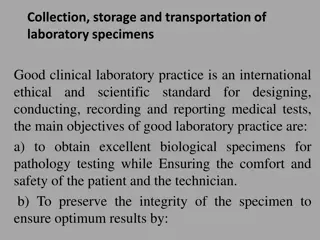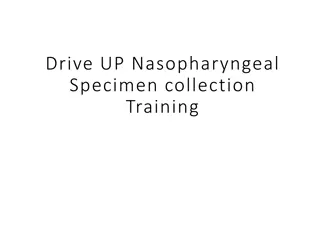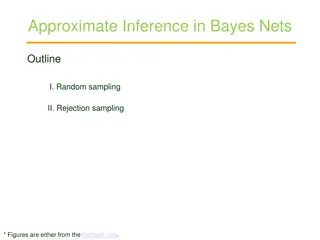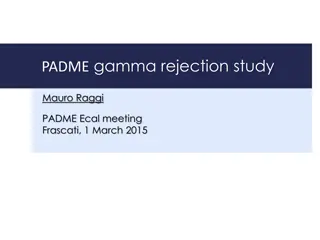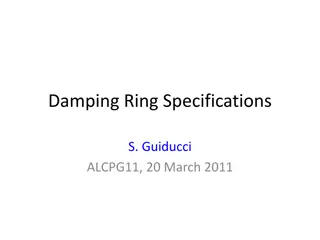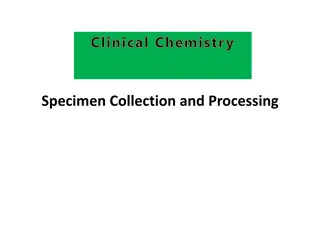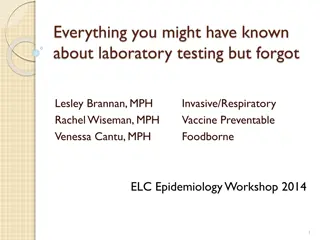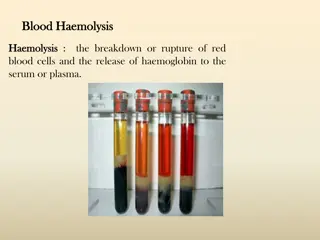Guidelines for Specimen Rejection and Acceptance
Specimens may be rejected if improperly labeled, insufficient quantity, delayed receipt, incompatible requisitions, or in improper containers. General and specific criteria are outlined for various tests including microbiology, urinalysis, blood cultures, and more. Adherence to these criteria helps ensure accurate and timely test results.
Download Presentation

Please find below an Image/Link to download the presentation.
The content on the website is provided AS IS for your information and personal use only. It may not be sold, licensed, or shared on other websites without obtaining consent from the author.If you encounter any issues during the download, it is possible that the publisher has removed the file from their server.
You are allowed to download the files provided on this website for personal or commercial use, subject to the condition that they are used lawfully. All files are the property of their respective owners.
The content on the website is provided AS IS for your information and personal use only. It may not be sold, licensed, or shared on other websites without obtaining consent from the author.
E N D
Presentation Transcript
Criteria For Specimen Rejection Dr Versha Prasad
Criteria For Specimen Rejection General Criteria All tests are unique in their testing requirements. To avoid specimen rejection or delayed turnaround times, please check specimen requirements to insure appropriate collection criteria is met. In general, specimens will be rejected for the following reasons: Specimens which are improperly labeled. Specimens in which the quantity is not sufficient for proper processing. Specimens in which there has been a significant time delay between specimen collection and specimen receipt (more than 24 hours), for which a transport tube/medium was not used and/or specimen results would be compromised.
Criteria For Specimen Rejection General Criteria Specimens and requisitions which are incompatible (i.e. urine specimen with requisition checked off for sputum). Specimens received with no requisition. Liquid specimens which are not sent in sterile, dry, leakproof containers. Requisitions which have been contaminated with a liquid specimen. SPECIMENS IN SYRINGE WITH NEEDLE ATTACHED. Physician and/or office staff will be contacted to remove needle before specimen will be processed. Hemolyzed or clotted blood specimens (for many tests).
Criteria For Specimen Rejection Specific Criteria In addition to the previously mentioned general criteria, some specimens have additional specific criteria for rejection. Routine Microbiology The most common reasons to reject a specimen are due to the addition of a preservative (such as formalin or alcohol). Sputum/Bronchial lavage Specimens which are poor quality (i.e. saliva) as indicated by gram stain (oral flora, rare polys, presence of epithelial cells). Limit one (1) per day, not to exceed three (3) per week. Urine Culture First morning specimen is preferred, but random specimen will be processed. Limit one (1) per day not to exceed three (3) per week. Specimen received after 2 hours of collection if not refrigerated or after 24 hours, if refrigerated.
Criteria For Specimen Rejection Specific Criteria Urinalysis Contaminated specimens-i.e., paper, feces. Specimens submitted in improper container. Specimen received after 2 hours of collection if not refrigerated or after 8 hours if refrigerated. Feces Specimen submitted in improper container. Other Body Fluids No specimen will be rejected without consulting with Technical Specialist or Pathologist. Blood Cultures No more than 4 blood culture sets will be drawn in 24 hours. No more than 3 blood culture sets for each subsequent and separate febrile illness.
Criteria For Specimen Rejection Specific Criteria Mycobacteriology Poor quality specimen (i.e. saliva). Specimens <10 mLs. More than three (3) consecutive specimens from the same site. Parasitology Stool specimens sent in a liquid other than saline, formalin, or PVA. More than three (3) consecutive specimens. Stool contaminated with urine. Stool containing barium, oils, laxatives, magnesium, or antidiarrheal compounds. Rectal swabs. Virology Samples that are not received in viral transport medium. Urines received and not on wet ice or refrigerated at 4 degrees C
For Other Laboratory Test Immunology Hemolyzed specimens-VARIES BY ANALYTE Chemistry SST tubes are not acceptable for therapeutic drug tests (except lithium). Hemolyzed specimens are not acceptable for potassium, magnesium, phosphorus, bilirubin, iron, TIBC. Ferritin, C3, C4, folate and most enzyme tests. SST or red-stoppered tube for ionized calcium must be at least 3/4 full. Do not open or otherwise expose blood sample to air. Specimens that require ice must be on ice.
For Other Laboratory Test Hematology Blood Hemolyzed-when submitted for coagulation testing. Clotted specimen. Any specimen brought to the laboratory which has not been stored under the proper conditions. Any specimen which requires a special anticoagulant for which no substitution is allowed, e.g. coagulation testing requires sodium citrate as an anticoagulant. Any specimen in which the blood/anticoagulant ratio is not correct for accurate results. Other Body Fluids No specimen will be rejected without consulting with Technical Specialist or Pathologist
For Other Laboratory Test Blood Bank Hemolyzed specimens Unlabeled specimens SST tubes can not be used or any tube containing and activators (red top plastic tubes) Inadequately labeled specimen which is not promptly corrected. Cytogenetics Blood not in a green top tube (with sodium heparin) Bone marrow not in a green-top tube (with sodium heparin) POC (Products of Conception) No fetal tissue In formalin or frozen (non-viable)
For Other Laboratory Test Cytology Fixative not added. Unsatisfactory (acellular). Histology Unresolved mislabeled or unlabeled specimen. Policy For Handling Rejected Specimens All specimens will be order entered into the computer. They may then be cancelled or logged off with an explanation of why theywere unacceptable. CLIENT WILL BE NOTIFIED OF ANY SPECIMEN PROBLEM
